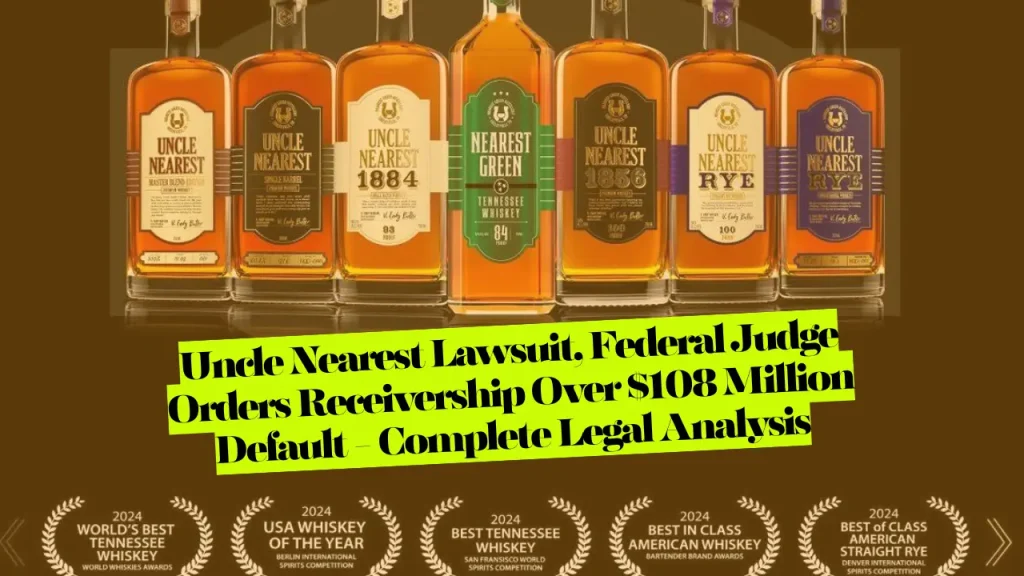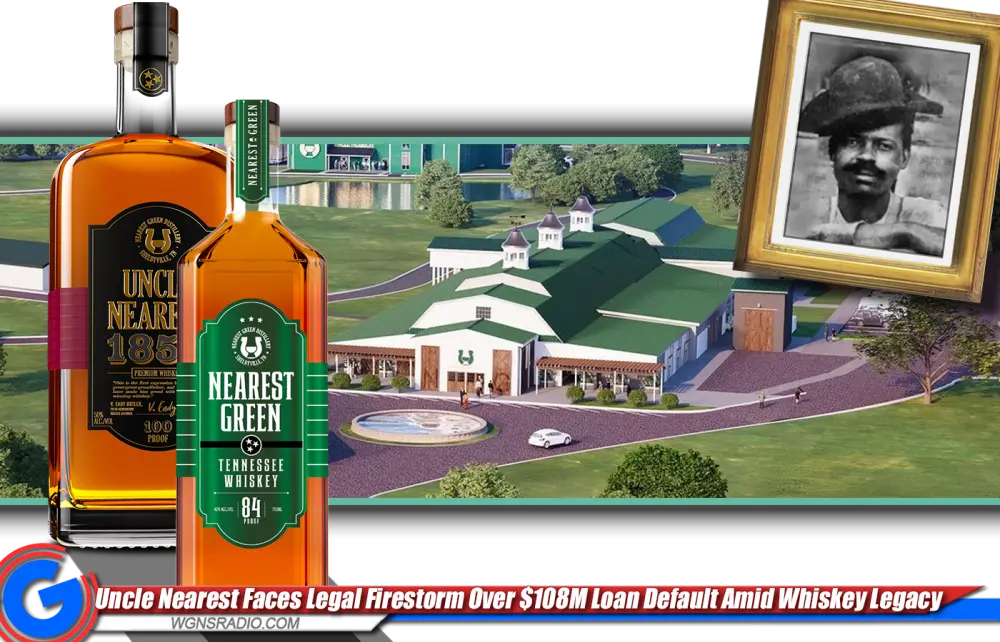Uncle Nearest Lawsuit: Federal Judge Orders Receivership Over $108 Million Default – Complete Legal Analysis
The Uncle Nearest lawsuit has taken a dramatic turn with a federal judge ordering a receivership for Nearest Green Distillery after the business defaulted on its US$100 million loan. This landmark case represents one of the most significant legal challenges facing a Black-owned spirits brand in recent history.
For stakeholders, investors, and industry observers, understanding the Uncle Nearest lawsuit’s complexities is crucial as it unfolds in federal court with potentially far-reaching consequences for the whiskey industry.
Table of Contents
What Is the Uncle Nearest Lawsuit About?
The lawsuit, filed in the U.S. District Court for the Eastern District of Tennessee on July 28, 2025, names Uncle Nearest, its Nearest Green Distillery, and co-founders Fawn and Keith Weaver as defendants. The legal action centers on allegations of loan default and financial mismanagement.
Farm Credit Mid-America claims Uncle Nearest owes them more than $100 million, but the Black-owned whiskey brand says there’s a lot more to the story. The case has evolved rapidly from initial filing to a federal court-ordered receivership in less than three weeks.
Key Allegations in the Uncle Nearest Lawsuit
The lawsuit contains several serious allegations that legal experts consider significant:
Loan Default Claims: Farm Credit Mid-America claims the company has been in default on its loans since as early as January 2024. The lender alleges systematic failure to meet payment obligations across multiple loan agreements.
Inventory Overstatement: The lawsuit claims that Uncle Nearest secured loans by overstating its barrel inventory values by $21 million. This allegation suggests potential fraud in the loan application process.
Property Purchase Issues: The loan company alleges Uncle Nearest failed to meet payments, and instead used the borrowed cash to buy a property in Martha’s Vineyard. This raises questions about proper use of borrowed funds.
Understanding the Receivership Order
The Uncle Nearest whiskey brand has been placed under receivership, raising questions about founder Fawn Weaver’s future role. A receivership is a court-appointed process where an independent party takes control of a company’s operations.
What Receivership Means for Uncle Nearest
When a federal judge orders receivership, several immediate changes occur:
Management Control: The court-appointed receiver assumes control of daily operations, replacing existing management temporarily or permanently.
Asset Protection: The receiver controls Nearest Green Distillery to protect the US$100 million owed to its creditors.
Financial Oversight: All major financial decisions require receiver approval, including spending, contracts, and strategic direction.
Uncle Nearest’s Response to the Lawsuit
Uncle Nearest has fought back on social media, claiming it is “built for this moment”. The company’s legal response addresses several key points raised in the lawsuit.
Company’s Defense Strategy
Payment History: Uncle Nearest said it made nearly US$9m in repayments in 2024. Once a mutual agreement on restructuring was reached in 2025, it paid US$7.5m immediately.
Transparency Claims: Regarding the Martha’s Vineyard property, the company maintains that the purchase was fully transparent, and alleges that the lender did not request or take action to perfect a security interest in the property.
Lender Awareness: The company also stated that Farm Credit Mid-America approved its loan increases without independently verifying the barrel counts and was aware of a negotiated pause in loan payments during 2025 restructuring talks.
Related Lawsuit: Mount Sinai Class Action Lawsuit

Financial Background and Context
Understanding the Uncle Nearest lawsuit requires examining the company’s recent financial trajectory. In early 2024, Fortune reported the company was “approaching unicorn status,” valued at $900 million after an oversubscribed capital raise.
From Success to Legal Troubles
The contrast between public success and private financial struggles illustrates common challenges in high-growth businesses:
Rapid Expansion: Founded by Weaver in 2017, Uncle Nearest quickly rose to become the top-selling Black-owned spirits brand, distributed in all 50 states and 12 countries.
Hidden Financial Stress: The lawsuit claims that Uncle Nearest, despite all the media coverage and praise, has been in default since at least January 2024.
Legal Implications and Industry Impact
The Uncle Nearest lawsuit carries significant implications beyond this single case:
Precedent for Minority-Owned Businesses
This case highlights unique challenges facing minority-owned businesses in securing and maintaining large-scale financing. Legal experts note the importance of proper documentation and communication with lenders.
Industry Lending Practices
The lawsuit raises questions about lending practices in the spirits industry, particularly regarding inventory valuation and collateral verification processes.
Timeline of Key Events
Understanding the Uncle Nearest lawsuit timeline helps clarify how quickly events unfolded:
- January 2024: Alleged loan default begins
- July 28, 2025: Farm Credit Mid-America files federal lawsuit
- August 7, 2025: Federal hearing held
- August 2025: Federal judge orders receivership for Nearest Green Distillery
What Happens Next in the Uncle Nearest Lawsuit?
The receivership order represents a critical juncture, but several outcomes remain possible:
Potential Resolution Paths
Restructuring Agreement: The receiver may negotiate new terms with Farm Credit Mid-America, potentially allowing Uncle Nearest to regain control.
Asset Sale: If restructuring fails, the receiver may sell company assets to satisfy creditor claims.
Liquidation: In worst-case scenarios, complete business dissolution could occur.
Impact on Stakeholders
The Uncle Nearest lawsuit affects multiple parties:
Employees and Operations
Fawn Weaver noted that “Nearest Green Distillery continues to see year-over-year growth in tourism revenue growth”, suggesting operations continue despite legal challenges.
Investors and Creditors
Investors who participated in recent funding rounds face potential losses, while Farm Credit Mid-America seeks to recover its $108 million investment.
Industry Observers
The case serves as a cautionary tale about rapid expansion and the importance of maintaining strong lender relationships.
Legal Analysis: Key Takeaways
From a legal perspective, the Uncle Nearest lawsuit illustrates several critical business law principles:
Due Diligence Importance
The inventory valuation allegations highlight the importance of accurate financial reporting in loan agreements.
Communication with Lenders
The lender claims the company was unresponsive or delayed in providing updated financials, emphasizing the need for transparent borrower-lender communication.
Security Interest Perfection
The Martha’s Vineyard property dispute shows how improper security interest handling can complicate legal proceedings.

Frequently Asked Questions About the Uncle Nearest Lawsuit
What is the Uncle Nearest lawsuit about?
The lawsuit involves Farm Credit Mid-America suing Uncle Nearest for allegedly defaulting on over $108 million in loans and overstating inventory values by $21 million.
What is a receivership, and what does it mean for Uncle Nearest?
A receivership means a court-appointed receiver now controls Uncle Nearest’s operations to protect creditor interests and company assets during legal proceedings.
How much money does Uncle Nearest owe?
Farm Credit Mid-America claims Uncle Nearest owes more than $108 million across several loans, including revolving, term, and real estate lines of credit.
What happens to founder Fawn Weaver’s role?
Founder Fawn Weaver’s role in the brand is in question while decisions are made about the new receivership.
When did Uncle Nearest allegedly default on its loans?
Farm Credit Mid-America claims the company has been in default on its loans since as early as January 2024.
What is Uncle Nearest’s defense against the lawsuit?
Uncle Nearest claims transparency in all transactions, argues the lender failed to verify inventory independently, and maintains it made substantial payments totaling over $16 million in 2024-2025.
Will Uncle Nearest continue operating during the lawsuit?
Yes, the receivership allows operations to continue under court oversight while protecting creditor interests and working toward resolution.
What could happen to the Uncle Nearest brand?
Possible outcomes include successful restructuring allowing the brand to continue, asset sale to new owners, or liquidation in worst-case scenarios.
How does this affect Uncle Nearest employees?
While operations continue under receivership, long-term employment depends on the case’s resolution and whether the company can successfully restructure or find new ownership.
What can other businesses learn from the Uncle Nearest lawsuit?
The case emphasizes the importance of accurate financial reporting, maintaining open communication with lenders, and properly documenting all major transactions and asset purchases.
Conclusion: The Future of Uncle Nearest
The Uncle Nearest lawsuit represents a critical moment for one of America’s most prominent Black-owned spirits brands. While the federal judge has ordered receivership for Nearest Green Distillery after the business defaulted on its $100 million loan, the story is far from over.
The receivership process, while challenging, also provides an opportunity for structured resolution that could preserve the brand’s legacy and operations. For legal professionals, business owners, and industry observers, this case serves as a compelling study in business law, lending practices, and crisis management.
As proceedings continue in federal court, stakeholders will be watching closely to see whether Uncle Nearest can navigate this legal challenge and emerge stronger, or whether this lawsuit marks the end of a remarkable entrepreneurial journey.
This article provides legal information for educational purposes and should not be considered legal advice. Individuals affected by similar situations should consult with qualified legal counsel for guidance specific to their circumstances.
About the Author

Sarah Klein, JD, is a licensed attorney and legal content strategist with over 12 years of experience across civil, criminal, family, and regulatory law. At All About Lawyer, she covers a wide range of legal topics — from high-profile lawsuits and courtroom stories to state traffic laws and everyday legal questions — all with a focus on accuracy, clarity, and public understanding.
Her writing blends real legal insight with plain-English explanations, helping readers stay informed and legally aware.
Read more about Sarah
